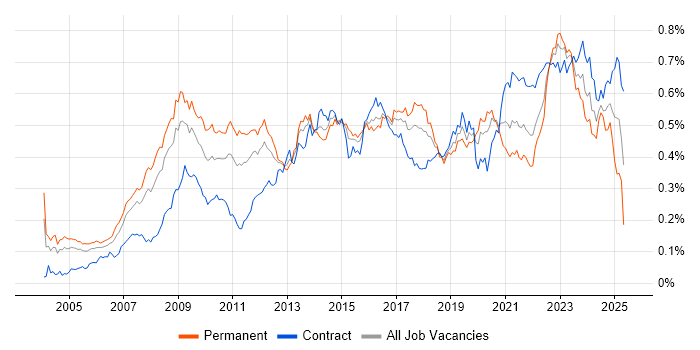Enterprise Architect
England > London
The median Enterprise Architect salary in London is £100,000 per year, according to job vacancies posted during the 6 months leading to 28 May 2025.
The table below provides salary benchmarking and summary statistics, comparing them to the same period in the previous two years.
| 6 months to 28 May 2025 |
Same period 2024 | Same period 2023 | |
|---|---|---|---|
| Rank | 356 | 418 | 351 |
| Rank change year-on-year | +62 | -67 | +336 |
| Permanent jobs requiring an Enterprise Architect | 36 | 94 | 282 |
| As % of all permanent jobs advertised in London | 0.29% | 0.40% | 0.85% |
| As % of the Job Titles category | 0.32% | 0.42% | 0.89% |
| Number of salaries quoted | 27 | 69 | 128 |
| 10th Percentile | £81,250 | £80,000 | £86,884 |
| 25th Percentile | £90,000 | £92,500 | £94,375 |
| Median annual salary (50th Percentile) | £100,000 | £110,000 | £110,000 |
| Median % change year-on-year | -9.09% | - | +8.48% |
| 75th Percentile | £118,750 | £120,000 | £120,000 |
| 90th Percentile | £143,500 | £123,000 | £138,250 |
| England median annual salary | £90,000 | £95,000 | £100,000 |
| % change year-on-year | -5.26% | -5.00% | - |
All Permanent IT Job Vacancies
London
For comparison with the information above, the following table provides summary statistics for all permanent IT job vacancies in London. Most job vacancies include a discernible job title that can be normalized. As such, the figures in the second row provide an indication of the number of permanent jobs in our overall sample.
| Permanent vacancies in London with a recognized job title | 11,289 | 22,453 | 31,519 |
| % of permanent jobs with a recognized job title | 90.22% | 94.39% | 95.14% |
| Number of salaries quoted | 6,829 | 16,734 | 23,288 |
| 10th Percentile | £41,200 | £37,500 | £42,000 |
| 25th Percentile | £55,000 | £51,143 | £55,000 |
| Median annual salary (50th Percentile) | £75,000 | £70,000 | £72,500 |
| Median % change year-on-year | +7.14% | -3.45% | +3.57% |
| 75th Percentile | £100,000 | £93,750 | £95,000 |
| 90th Percentile | £122,500 | £115,000 | £115,000 |
| England median annual salary | £56,000 | £52,500 | £60,800 |
| % change year-on-year | +6.67% | -13.65% | +1.33% |
Enterprise Architect
Job Vacancy Trend in London
Job postings that featured Enterprise Architect in the job title as a proportion of all IT jobs advertised in London.

Enterprise Architect
Salary Trend in London
3-month moving average salary quoted in jobs citing Enterprise Architect in London.
Enterprise Architect
Salary Histogram in London
Salary distribution for jobs citing Enterprise Architect in London over the 6 months to 28 May 2025.
Enterprise Architect
Job Locations in London
The table below looks at the demand and provides a guide to the median salaries quoted in IT jobs citing Enterprise Architect within the London region over the 6 months to 28 May 2025. The 'Rank Change' column provides an indication of the change in demand within each location based on the same 6 month period last year.
| Location | Rank Change on Same Period Last Year |
Matching Permanent IT Job Ads |
Median Salary Past 6 Months |
Median Salary % Change on Same Period Last Year |
Live Jobs |
|---|---|---|---|---|---|
| Central London | +29 | 5 | £100,000 | +3.90% | 6 |
| Enterprise Architect England |
|||||
Enterprise Architect Skill Set
Top 30 Co-occurring Skills and Capabilities in London
For the 6 months to 28 May 2025, Enterprise Architect job roles required the following skills and capabilities in order of popularity. The figures indicate the absolute number co-occurrences and as a proportion of all permanent job ads across the London region featuring Enterprise Architect in the job title.
|
|
Enterprise Architect Skill Set
Co-occurring Skills and Capabilities in London by Category
The follow tables expand on the table above by listing co-occurrences grouped by category. The same employment type, locality and period is covered with up to 20 co-occurrences shown in each of the following categories:
